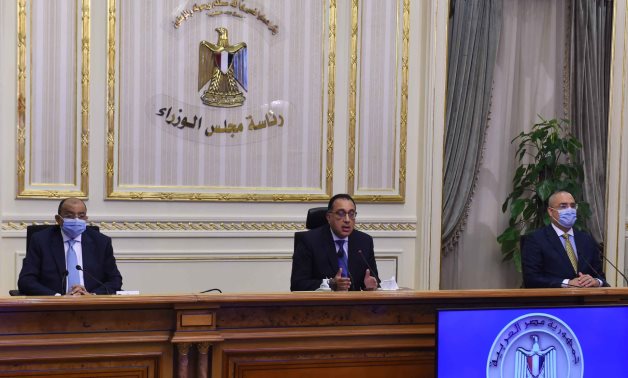
Egypt’s Prime Minsiter Mustafa Madbouli (middle) speaks in a press conference attended by a number of ministers including the housing minister (R) and the local development minister – Cabinet
CAIRO – 9 September 2020: Unplanned random construction in Egypt represents around 50 percent of buildings at all cities and villages, Prime Minister Mustafa Madbouli said, adding that the state has lost about 400,000 feddans of agricultural land, due to suburban sprawl.
One feddan equals to 1.03 acre.
In a press conference with a number of ministers on Wednesday, Madbouli said the state lost 90,000 feddans of agricultural land since 2011, deeming it as a “real disaster,” as Egyptian people depend on agriculture as a main source of food and as many job opportunities linked to agriculture were also wasted.
Year 2011 marks the January 25 revolution, when millions of protesters took to streets to protest corruption and dictatorship and managed to oust late President Hosni Mubarak, who ruled for three decades and died in February this year.
As a result of unplanned construction on agricultural land, the state has borne a cost worth LE 150,000 ($9,505) to LE 200,000 ($12,674) to reclaim one feddan in desert lands as an alternative, which means that LE 18 billion ($1.14 billion) is needed to compensate 90 feddans wasted by suburban sprawl.
Law number 1 of 2020 stipulates that a reconciliation can be reached with the state concerning buildings constructed in violation of laws organizing construction process.
The law has set reconciliation fines between LE 50 ($3.17) to LE 2,000 ($127) per meter. A reconciliation request shall be submitted within 6 months ending on September 30. The prime minister can extend it for one more time.
During the press conference, Madbouli said the 2020 law stated the reconciliation fine can be paid in installments throughout three years without interests. He added that a discount ranging between 10 percent and 55 percent on reconciliation fines was applied, given social classes of people inhabiting the area.
Madbouli noted that the reconciliation law is not a punitive measure but it rather offers a service to citizens, clarifying that reconciliation gives the property an official status, which he said obliges the government to provide all services to that property.
Comments
Leave a Comment